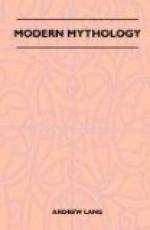Lastly (ii. 403), when totems infected ’even those who ought to have been proof against this infantile complaint’ (which is not even a ’disease of language’ of a respectable type), then ’the objection that a totem meant originally a clan-mark was treated as scholastic pedantry.’ Alas, I fear with justice! For if I call Mr. Arthur Balfour a Tory will Mr. Max Muller refute my opinion by urging that ’a Tory meant originally an Irish rapparee,’ or whatever the word did originally mean?
Mr. Max Muller decides that ’we never find a religion consisting exclusively of a belief in fetishes, or totems, or ancestral spirits.’ Here, at last, we are in absolute agreement. So much for totems and sign-boards. Only a weak fanatic will find a totem in every animal connected with gods, sacred names, and religious symbols. But totemism is a fact, whether ‘totem’ originally meant a clan-mark or sign-board in America or not. And, like Mr. Sayce, Mr. Frazer, Mr. Rhys, Dr. Robertson Smith, I believe that totemism has left marks in civilised myth, ritual, and religion, and that these survivals, not a ‘disease of language,’ explain certain odd elements in the old civilisations.
A Weak Brother
Our author’s habit of omitting references to his opponents has here caused me infinite inconvenience. He speaks of some eccentric person who has averred that a ‘fetish’ is a ‘totem,’ inhabited by ’an ancestral spirit.’ To myself it seems that you might as well say ’Abracadabra is gas and gaiters.’ As no reference was offered, I invented ’a wild surmise’ that Mr. Max Muller had conceivably misapprehended Mr. Frazer’s theory of the origin of totems. Had our author only treated himself fairly, he would have referred to his own Anthropological Religion (pp. 126 and 407), where the name of the eccentric definer is given as that of Herr Lippert. {78} Then came into my mind the words of Professor Tiele, ’Beware of weak brethren’—such as Herr Lippert seems, as far as this definition is concerned, to be.
Nobody knows the origin of totemism. We find no race on its way to becoming totemistic, though we find several in the way of ceasing to be so. They are abandoning female kinship for paternity; their rules of marriage and taboo are breaking down; perhaps various totem kindreds of different crests and names are blending into one local tribe, under the name, perhaps, of the most prosperous totem-kin. But we see no race on its way to becoming totemistic, so we have no historical evidence as to the origin of the institution. Mr. McLennan offered no conjecture, Professor Robertson Smith offered none, nor have I displayed the spirit of scientific exactitude by a guess in the dark. To gratify Mr. Max Muller by defining totemism as Mr. McLennan first used the term is all that I dare do. Here one may remark that if Mr. Max Muller really wants ‘an accurate definition’ of totemism, the works of McLennan,




